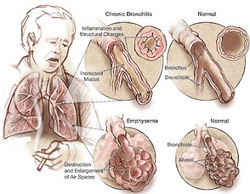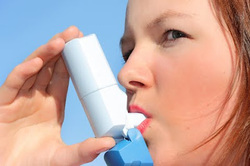
The air we breathe contains the main source of energy for body cells, oxygen, which rely to carry out their normal activities and that this organism is healthy. This element is taken by breathing through the nose, where it is heated and moistened, plus it is cleaned of impurities by the villi which serve as a filter. On the way to the lungs, the air passes through the trachea, pipeline across ending in two tubes called bronchi (right and left).
The bronchi divide into smaller and smaller tubes, which are called bronchioles, which end in tiny air sacs, called alveoli, whose job is to allow oxygen to reach the blood, while that is collected and used (called carbon dioxide) to remove the breathing (this process is known as "gas exchange").
However, virus or bacteria entering the body affect certain organs, and whether they belong to the respiratory system may generate a cold or flu, For example. When germs get into the bronchi will cause them to swell, giving rise to what we know as bronchitis, which can be acute, if it disappears after several days, or chronic, beginning misleading, as appears to be flu, and over time can slowly drive to have difficulty breathing.
What to do
Bronchitis occurs most often during the winter, since naturally the protection of our body remarkably lowered. It is also caused by influenza-served tables, chronic lung diseases, including tuberculosis (caused by the microorganism Mycobacterium tuberculosis, the infectious nature) and emphysema (abnormal presence of air in the tissues of the lungs that makes breathing difficult) - or because of sinusitis (inflammation of the sinuses) and chronic allergies in children, problems with tonsils. Do not dismiss it can also be caused by contact with dust, pollution and smoke snuff.
In the first instance be confused with common cold, as there are runny nose, fatigue, chills and sore throat and fever. Nor is it unusual muscle pain, headache, dry cough and, after 1 or 2 days, no spitting up phlegm yellow or green. Occasionally there will be shortness of breath or chest pain when breathing deeply or coughing.
To recognize the extent of disease may be appealed to the analysis of the sputum to identify germs, but if symptoms are persistent need to make a chest radiograph.
Anyway is important to follow these instructions:
* Avoid contact with sick people.
* Keep it warm in cold weather, even using scarf over mouth and nose.
* If you suffer from any respiratory tract infection, must be addressed immediately to prevent it becoming a chronic condition.
* It is recommended to quit smoking and stay away from smoke and dust sources.
* Taking vitamin C helps improve the body's defenses against attack by viruses and bacteria. It is found naturally in foods such as lemon, orange, guava, Brussels sprouts, cauliflower, strawberries, kiwi, cantaloupe, green peppers, tomatoes and tomato. It can also be delivered through vitamin supplements.
* Breathe always through the nose, mouth and not to introduce air into the lungs warmer.
* Try to stay indoors on days of temperature inversion or high pollution, preferably with the windows closed.
* Use a humidifier if the air in your home is very dry.
To improve the annoying symptoms you can take a cough suppressant or expectorant counter to relieve coughs, a decongestant for nasal congestion, to control fever an antipyretic, and if there is muscle pain and headaches take pain medicine. If breathing discomfort is constant, you can ask your doctor to prescribe the so-called bronchodilators, Drugs that allow more oxygen to enter the lungs by relaxing and widening of the bronchi, there are in syrup, tablet or spray, sold by prescription only.
Be sure to ask your doctor about breathing exercises, which will help increase strength and endurance of the muscles that control breathing and certain techniques to help clear the lungs of mucus.
Finally, bed rest tries everything possible to refuel if you are a victim of bronchitis. Make awareness about quitting because the weakening of the respiratory tract can lead to "fights" to health as this time we have been busy.
Get more remedies for asthma children and treatment for asthma.Information on bronchial asthma treatment

 RSS Feed
RSS Feed